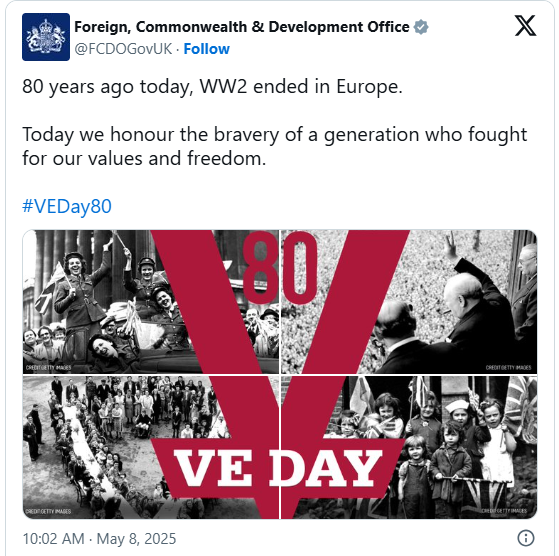On May 8th, the world celebrated the 80th anniversary of the end of World War II. It was, for many, a solemn day. The end of World War II was meant to usher in a new dawn of stability and harmony amongst the nations of the world. The struggle to defeat Nazi Germany symbolized victory over tyranny as well as the ability of conflicted states to rally together in order to oppose evil and injustice. May 8th, 1945 was a moment of jubilation and exaltation as Europe finally stood free, united and at peace. For a few hours on that fateful May 8th exactly 80 years ago, hope descended in its all majesty on the streets of Paris, London, Amsterdam and Moscow.
Yet peace was not to last. World War II would soon be followed by the Cold War and a period of 50 years in which the world stood at the brink of nuclear annihilation. Notably, the legacy of World War II was integral to the historical narratives of both the West and the Soviet Union, and both sides celebrated the victory over Nazi Germany. However, the meaning of this victory differed. The Soviet Union celebrated The Great Patriotic War and the heroic stand of the Red Army which overcome insurmountable odds, while paying a devastating price. It was a lesson regarding the pain and blood sacrifice required by all Soviets to protect their socialist Eden. In the West, World War II was proof that democratic states could prevail over despots if they held true to their values and a constant reminder that determination leads to liberation from oppressive yokes.
Nowadays the Winds of War can be felt in many regions across the world. Most notably on May 8th, Europe is at war as Ukraine and Russia are engaged in a bloody stalemate claiming the lives of tens of thousands of innocents. Indeed, the 2020s have been marked by strife, discord and violence throughout the continent with nations across Europe rebuilding their armies and spending billions on defense and security. In many countries, Russia and not terrorism is now considered to be the number one threat to national security while Cold War relics and agencies are brought back to life to help contend with Russian misinformation and psychological warfare.
It was for this reason that tweets shared on digital diplomacy accounts on May 8th were particularly interesting. Although World War II is frequently mentioned in tweets published by European diplomats and foreign ministries, and although World War II images are often invoked online by diplomats to help promote current day policies, tweets published on May 8th differed in important ways.
First, although May 8th denotes a collaborative effort to defeat Nazi Germany, some digital diplomacy channels focused on national efforts and national achievements. Such was the case with UK as the FCO tweet stated that “Today we honour the bravery of a generation who fought for our values and freedom”. The emphasis here is on the words “we”, “our” and the iconic images from Britain’s past that accompany the tweet.
A similar sentiment was expressed by the French MFA stating “80 years ago, France celebrated the victory over Nazism. On this occasion, discover our exhibition on the railings of the Quai d’Orsay with photos of liberated France between 1944 and 1945”. Both countries committed historical appropriation with the past being selectively retold. Britain would not have defeated Germany without Russia; France would not have been liberated without the UK. Yet this is not mentioned in either tweet or inferred from accompanying images. World War II was thus a national story, with national legacies and national lessons. It has no international dimension worthy of mentioning.
The reason for this national retelling of an inherently international affair may stem from several factors. First, both MFAs chose messages that would resonate with national audiences. This is not surprising as much digital diplomacy is domestic diplomacy nowadays. Second, this national telling may be indicative of growing nationalist sentiments in both countries with nationalist parties on rise across the UK and France. Third, this retelling may be indicative of the times we live in or a signal that we have entered another moment of rupture in which states become preoccupied with protecting national borders and strengthening national narratives.
Second, Ukrainian diplomats also appropriated history yet they chose an international retelling of World War II. Unlike the UK or France, Ukraine’s MFA joined “the world in honoring the memory of the millions of victims of World War II”. Yet the MFA added that “remembrance means responsibility”, suggesting that the nations of Europe must collectively maintain their responsibility to bring peace to Europe and that without such an effort remembrance become a hollow exercise in vanity. The abstract image used by the Ukrainian MFA is far mor inclusive the national images used by France and the UK.
Unlike the UK and France, also expressed a sense of urgency writing “The past is not behind us – it is repeating before our eyes…Now, Russia is once again bringing war, destruction, and death. ” and using the hashtag “#NeverAginisNow”. Of course, Ukraine’s international retelling of World War II is not without its own reason as the country remains reliant on international support to protect its borders from the Russian invasion.
The third interesting aspect of May 8 tweets was the use of historic images, which could be found across several European digital diplomacy accounts as shown below. These visuals were not randomly selected. The lack of color attests to their age and authenticity so these images serve an evidentiary purpose- they lend credence to each nation’s retelling of World War II. These visuals are actually rhetorical devices that facilitate historical appropriation and allow for very different telling of the same event.
The past is always present on digital diplomacy accounts as diplomats use the past to make sense of the present. But how one retells the past also shapes the future. National retellings that highlight national trials and national achievements create a national future in which the ‘international’ becomes less important. This is a terrifying prospect as it is the international community, and a commitment to international solutions to international challenges that is the true legacy of World War II.




 (@francediplo_EN)
(@francediplo_EN)  (@MFA_Ukraine)
(@MFA_Ukraine)  | #StandWithUkraine
| #StandWithUkraine 









